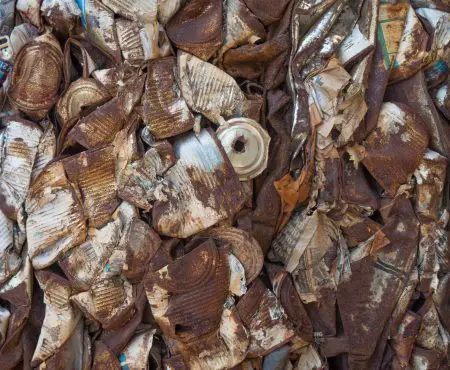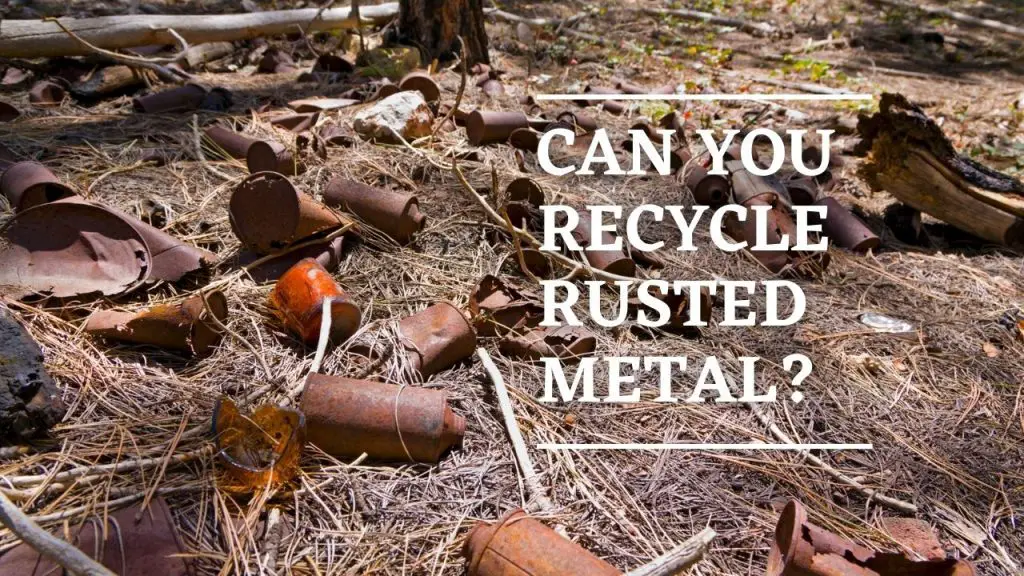Metal is a common material that’s often used in building items, given that they’re strong and can last for a long time. However, you may occasionally come across things that have already been covered in rust, making the metal unsafe for use. So, what can you do with the rusted metal?
Rusted metal is recyclable as long as it isn’t wholly deteriorating. You can take lightly rusted metal to your local recycling center. Heavily deteriorated metal is better off going to the landfill as it probably won’t be accepted.
Recycling commonly comes to mind, as you’ll not only play a part in helping reduce and reuse materials, but you may also earn a little money back from it. But can you recycle rusted metal? Technically, you can recycle rusted metal, although the rust may have to be removed before it can be reused.
If you’re new to recycling rusted metal, this may sound like a confusing statement. Don’t worry; we’ll dive deeper into how you can safely recycle your rusted metal materials, discuss what makes metal rust, and discover how to prevent it beforehand.
Why Does Metal Rust, and How Can You Prevent It?
To best understand whether rusted metal can or cannot be recycled, it’s best to discover why they rust in the first place.
When extracted from the earth, metal is better known as an ore in an oxidized state. This extraction process is also known as smelting and causes the oxygen and iron bonds of the ore to separate so it can be further refined.
As the metals are later exposed to water and oxygen, rust begins forming on the material. Rust is often visible in a reddish-brown color when left in the open but becomes green if the metal is submerged in water. The metal reacts with the underwater chloride, causing the color shift.
Rusted metal also poses a rough surface when touched, unlike the smooth sheen you’ll often see in newer metals.
If you’re keen to prevent metal from rusting, you may opt to protect it with various protection agents. Aluminum oxide – for example, helps prevent the metals from rusting quickly, creating the aluminum material we know today. Protective agents like Vaseline or nail varnish also work well in helping to prevent rust from metals.
How to Restore Rusted Metal for Recycling
Now that you know how rust forms in metal, you may want to see how you can recycle your rusted metals. The best way to do this is by contacting a trusted recycler around your area, as they can advise you on your next steps to recycling your rusted metals.
However, not all recyclers accept rusted metals, while others may give you a much lower price to purchase and recycle your rusted metals. This is because the metals must be restored before they can be recycled, and some recyclers may find this process a hassle.

The recycling process of rusted metals may also require what recyclers call purification, which includes adding various elements to bond with the oxygen in the metal. This purification removes dirt, dried paint, or ink previously used on the metal.
However, you can remove any light rust that is present at home. Here are some easy ways to help you remove the rust before you send them for recycling:
Using homemade products
Homemade products are great if you have a small amount of rust to remove from your rusted metals. You can easily do this with steel wool and a mix of lemon juice with vinegar or baking soda. Once you have all your cleaning agents ready, lightly scrub on the rusted areas of the metal, you want to restore.
The downside to using homemade products is that you may damage the metal further. Thus, you should exercise care if you’re scrubbing on the rusted areas of the metal with your homemade cleaning agent, as you wouldn’t want the metal to be deemed unrecyclable.
Using homemade products is a cheap way to remove rust from metals but may not be suitable if you have many rusted metal parts to clean. If you have sensitive hands, you may also have to wear gloves when restoring rusted metal, as the mix can cause your hands to dry and peel.
Using commercial rust removers
An easier way to restore rusted metals is by using commercial rust removers. You can find these for sale in any local hardware store or purchase them from reputable sellers online. These rust removers are often made for commercial use to have stronger rust-removing capabilities.
Unfortunately, commercial rust removers are not as affordable as using homemade products. If you have a large amount of rusted metal to restore, using commercial rust removers can prove an expensive investment, and not everyone would be comfortable with the idea.
As commercial rust removers often use a variety of chemicals in their products, it’s advisable to wear the appropriate safety gear when using it. Anyone with sensitive skin should wear gloves when using commercial rust removers to restore rusted metals.
Conclusion
In conclusion, you can technically recycle rusted metal, but you should try removing the rust beforehand. This should help boost the value of unwanted metals when sending them away to scrap metal recyclers.
Alternatively, you may consider various rust-prevention tips for your metal parts. Metal parts often exposed to sun and rain are more vulnerable to rust, so you should apply to protect agents that help deter rust. Metal materials like aluminum are also less susceptible to rust, making them excellent materials for various uses.
If you have large units of rusted metal to recycle, you should first contact the scrap recycler to evaluate whether they can recycle your material. This could save pick-up or drop-off costs and make it easier to decide your next best step in dealing with your rusted metal parts and pieces.

